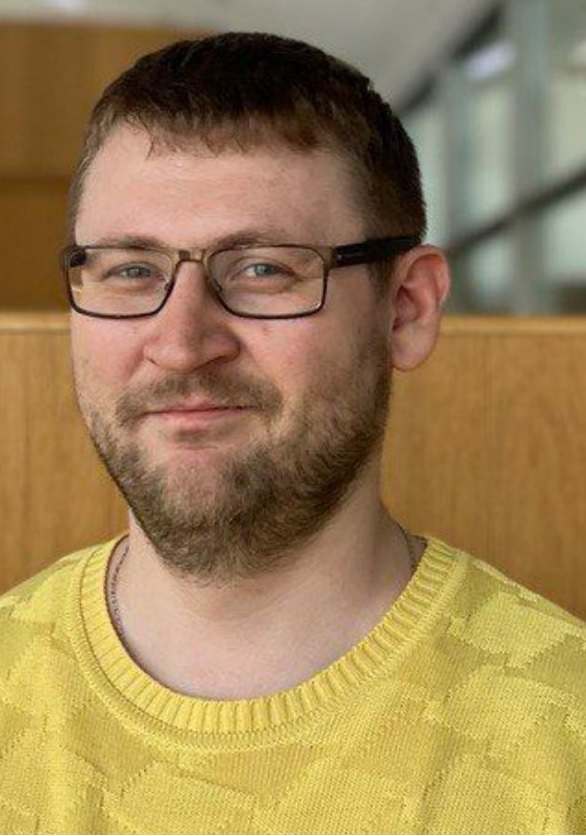Ivan Novikov, postdoc
 Ivan Novikov was graduated from the Department of Problems in Physics and Energetics at the Moscow Institute of Physics and Technology in 2013. Then he went to Institute of Numerical Mathematics of the Russian Academy of Sciences (INM RAS) and successfully defended his PhD thesis related to mathematical modelling and numerical methods in March 2016.
Ivan Novikov was graduated from the Department of Problems in Physics and Energetics at the Moscow Institute of Physics and Technology in 2013. Then he went to Institute of Numerical Mathematics of the Russian Academy of Sciences (INM RAS) and successfully defended his PhD thesis related to mathematical modelling and numerical methods in March 2016.
Ivan has been working at Skoltech since May 2016. The main topic of his research is the development of machine-learning interatomic potentials (MLIPs) and algorithms for their fitting. He developed an algorithm for automated construction of the MLIPs allow one to accurately predict gas-phase chemical reaction rates. He participated in the investigation of 2D materials with MLIPs. Ivan Novikov is one of the developers of the open source codes MLIP-2 and MLIP-3.
Now Ivan is working on the development of MLIPs with magnetic degrees of freedom. He has already developed the magnetic functional form of MLIP for single-component materials and reproduced the properties of iron in different magnetic states. He is a PI of the RScF grant 22-73-10206 “Development of machine-learning interatomic potentials with magnetic degrees of freedom”.
Major publications:
1. Evgeny V. Podryabinkin, Kamil Garifullin, Alexander V. Shapeev, Ivan S. Novikov. MLIP-3: Active learning on atomic environments with Moment Tensor Potentials (arxiv:2304.13144)
2. Ivan S. Novikov, Edgar M. Makarov, Alexander V. Shapeev, Yury V. Suleimanov. Making thermal rate constant calculations reliable using best practices: case study of OH+HBr -> Br+H2O (arxiv:2206.01478)
3. Ivan S. Novikov, Olga S. Kovalyova, Alexander V. Shapeev, Max Hodapp. AI-accelerated materials informatics method for the discovery of ductile alloys, Journal of Materials Research, 2022 (DOI:10.1557/s43578-022-00783-z)
4. Ivan S. Novikov, F. Kormann, B. Grabowski, Alexander V. Shapeev. Magnetic Moment Tensor Potentials for collinear spin-polarized materials reproduce different magnetic states of bcc Fe, npj Computational Materials, 2022 (DOI:10.1038/s41524-022-00696-9)
5. Bohayra Mortazavi, Ivan S. Novikov, Alexander V. Shapeev. A machine-learning-based investigation on the mechanical/failure response and thermal conductivity of semiconducting BC2N monolayers, Carbon, 2022 (DOI:10.1016/j.carbon.2021.12.039)
6. Ivan S. Novikov, Yury V. Suleimanov, Alexander V. Shapeev. Assessing Parameters for Ring Polymer Molecular Dynamics Simulations at Low Temperatures: DH+H Chemical Reaction, Chemical Physics Letters, 2021 (DOI:10.1016/j.cplett.2021.138567)
7. Bohayra Mortazavi, Evgeny V. Podryabinkin, Ivan S. Novikov, Timon Rabczuk, Xiaoying Zhuang, Alexander V. Shapeev. Accelerating first-principles estimation of thermal conductivity by machine-learning interatomic potentials: A MTP/ShengBTE solution, Computer Physics Communications, 2021 (DOI:10.1016/j.cpc.2020.107583)
8. Ivan S. Novikov, Konstantin Gubaev, Evgeny V. Podryabinkin, Alexander V. Shapeev. The MLIP package: Moment Tensor Potentials with MPI and Active Learning, Machine Learning: Science and Technology, 2020 (DOI:10.1088/2632-2153/abc9fe)
9. Bohayra Mortazavi, Ivan S. Novikov, Evgeny V. Podryabinkin, Stephan Roche, Timon Rabczuk, Alexander V. Shapeev, Xiaoying Zhuang. Exploring phononic properties of twodimensional materials using machine learning interatomic potentials, Applied Materials Today, 2020 (DOI:10.1016/j.apmt.2020.100685)
10. Bohayra Mortazavi, Evgeny V. Podryabinkin, Ivan S. Novikov, Stephan Roche, Timon Rabczuk, Xiaoying Zhuang, Alexander V. Shapeev. Efficient machine-learning based interatomic potentials for exploring thermal conductivity in two-dimensional materials, Journal of Physics: Materials, 2020 (DOI:10.1088/2515-7639/ab7cbb)
11. Ivan S. Novikov, Alexander V. Shapeev, Yury V. Suleimanov. Ring polymer molecular dynamics and active learning of moment tensor potential for gas-phase barrierless reactions: Application to S+H2, The Journal of Chemical Physics, 2019 (DOI:10.1063/1.5127561M)
12. Ivan S. Novikov, Alexander V. Shapeev. Improving accuracy of interatomic potentials: more physics or more data? A case study of silica, Materials Today Communications, 2019 (DOI:10.1016/j.mtcomm.2018.11.008)
13. Ivan S. Novikov, Yury V. Suleimanov, Alexander V. Shapeev. Automated Calculation of Thermal Rate Coefficients using Ring Polymer Molecular Dynamics and Machine-Learning Interatomic Potentials with Active Learning, Physical Chemistry Chemical Physics, 2018 (DOI:10.1039/C8CP06037A)